
In botany, phyllotaxis or phyllotaxy is the arrangement of leaves on a plant stem. Phyllotactic spirals form a distinctive class of patterns in nature.

Lithops is a genus of succulent plants in the ice plant family, Aizoaceae. Members of the genus are native to southern Africa. The name is derived from the Ancient Greek words λίθος 'stone' and ὄψ 'face', referring to the stone-like appearance of the plants. They avoid being eaten by blending in with surrounding rocks and are often known as pebble plants or living stones. Lithops is both the genus name and the common name. The formation of the name from the Ancient Greek -ops means that even a single plant is called a Lithops.
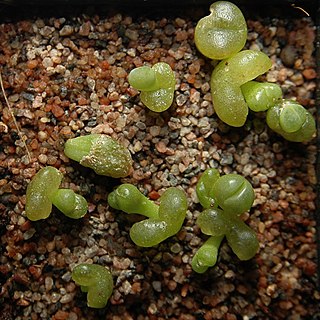
Lithops optica is a species of plant in the family Aizoaceae, endemic to Namibia.

Conophytum is a genus of South African and Namibian succulent plants that belong to the family Aizoaceae. The name is derived from the Latin conus (cone) and Greek phytum (plant). The plants are also known as knopies, waterblasies, sphaeroids, conos, cone plants, dumplings, or button plants.

In botany, succulent plants, also known as succulents, are plants with parts that are thickened, fleshy, and engorged, usually to retain water in arid climates or soil conditions. The word succulent comes from the Latin word sucus, meaning "juice" or "sap".
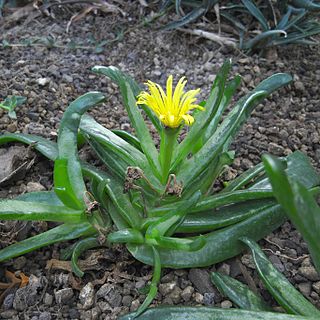
Glottiphyllum is a genus of about 57 species of succulent subtropical plants of the family Aizoaceae. It is closely related to the Gibbaeum and Faucaria genera. The name comes from ancient Greek γλωττίς glottis "tongue" and φύλλον phyllon "leaf". The species are native to South Africa, specifically to Cape Province and the Karoo desert. They grow in rocks and soils incorporating slate, sandstone and quartz. Rainfall in their native areas is between 125 and 500 mm, most of which falls in March and November.
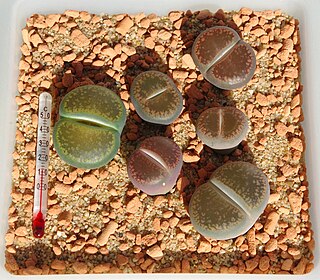
Lithops aucampiae is a species of flowering plant in the family Aizoaceae, found in South Africa. it was named after Juanita Aucamp, who found a specimen on her father's farm in Postmasburg, Northern Cape in 1929.

Glottiphyllum longum is a species of succulent plant in the family Aizoaceae, native to the Western Cape and Eastern Cape Provinces, South Africa.

Lithops viridis is a species of plant in the family Aizoaceae.

Glottiphyllum cruciatum is a rare species of succulent plant, of the family Aizoaceae. It is indigenous to arid areas near Oudtshoorn in the Western Cape, South Africa. The plant has many synonyms including Glottiphyllum angustum.

Lapidaria is a monotypic genus of dwarf succulent plants in the family Aizoaceae. The only species it contains is Lapidaria margaretae, also known as the Karoo rose.
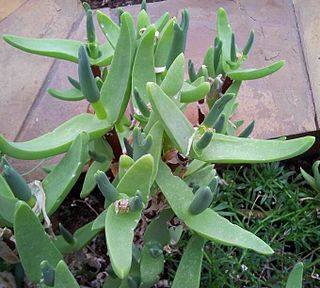
Mitrophyllum is a genus of succulent plants of the family Aizoaceae, indigenous to the arid region around the Richtersveld, on the border of South Africa and Namibia.
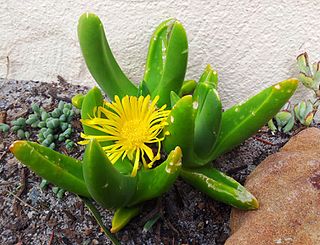
Glottiphyllum regium is a rare species of succulent plant, in the family Aizoaceae. It is known locally as "koeispene". It is restricted to a small arid area near Calitzdorp in the Western Cape, South Africa.

Glottiphyllum depressum is a common species of succulent plant, of the family Aizoaceae, native to South Africa.

Glottiphyllum surrectum is a species of succulent plant, in the family Aizoaceae. It is indigenous to arid areas of the Little Karoo, in the Western Cape, South Africa.

Glottiphyllum oligocarpum is a species of succulent plant, in the family Aizoaceae. It is indigenous to arid areas of the Little Karoo, in the Western Cape, South Africa.

Glottiphyllum fergusoniae is a species of succulent plant, of the family Aizoaceae. It is indigenous to the western part of the Little Karoo, in the Western Cape, South Africa.

Glottiphyllum nelii is a species of succulent plant, in the family Aizoaceae. It is indigenous to the arid Great Karoo region, South Africa.
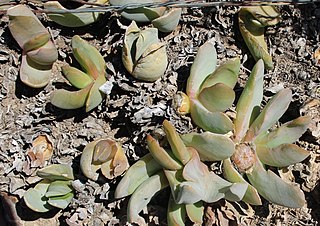
Glottiphyllum carnosum is a rare species of succulent plant, of the family Aizoaceae. It is indigenous to arid areas between the towns of Calitzdorp and Oudtshoorn in the Western Cape, South Africa. It co-occurs with several other species of Glottiphyllum.
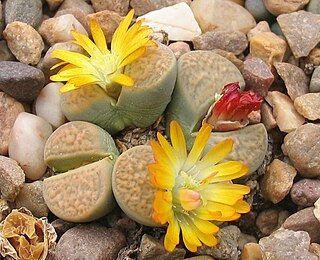
Lithops divergens is a succulent plant species of the genus Lithops under the family Aizoaceae. It grows around the regions of Southern Africa and it able to withstand intense climatic changes due to its resilience as a succulent. The average annual rainfall for its natural environment is less than 150mm, occurring primarily in winter which is unusual for a Lithops.





















